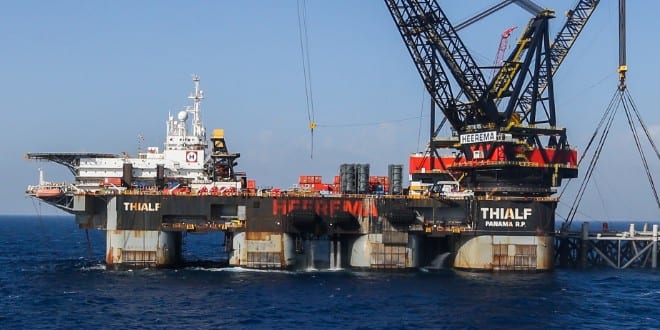The first of four giant barges carrying sections of the Leviathan natural gas platform set out on a 7,000-mile voyage from Texas and the Gulf of Mexico to the Mediterranean Sea last week. The platform, comprised of five operational units, will be erected in 280 feet of water 7 miles off the coast of Israel and will rise 155 feet above sea level. When fully assembled in September, the platform topside decks will be 335 feet long, 260 feet wide, and weigh 38,000 tons, enabling the platform to drill three miles into the seabed.
Discovered in 2010, Leviathan contains about two-thirds of all the gas resources discovered off the coast of Israel so far and is one of the world’s largest deepwater gas discoveries in the first decade of the 21st century. Development of the Leviathan reservoir is the largest infrastructure project ever undertaken in the history of Israel. Funded by the private sector, a Texas-based Noble Energy partnered with Israeli Delek Drilling have invested $3.75 billion to date. In 2018, the two companies signed a ten-year contract for $15 billion.
The developers believe that the Leviathan gas reservoir will grant Israel energy security, inject hundreds of billions of shekels to the state treasury from royalties and taxes, enable export of natural gas to countries in the region, and strengthen the geopolitical status of Israel. Even by conservative estimates, Leviathan holds enough gas to meet Israel’s domestic needs for 40 years. It is expected to begin transferring gas to a pipeline on the mainland before the end of the year.
The contract links Israel and Egypt economically as well as requiring their respective natural gas networks to be physically connected. Construction of a 1,250-mile underwater pipeline connecting Israeli gas to Greece, Italy, and Cyprus at a cost of $7 billion has been proposed and is awaiting approval from the respective countries. The project will also require approval by the European Commission.
Though the name may seem random, Leviathan, a mythical sea monster, plays a prominent role in Jewish eschatology. A section of the Talmud (the Oral Law) describes the post-Messianic role of a large fish called the Leviathan. In the Tractate of Baba Batra 75a, it is written that God originally produced a male and a female Leviathan. God became concerned that in multiplying, the species would destroy the world. God killed the female Leviathan, preserving her flesh for the special banquet that will be given to the righteous on the arrival of the Messiah. The banquet will be held inside a huge tent made from the Leviathan’s skin.
Source: Israel in the News

